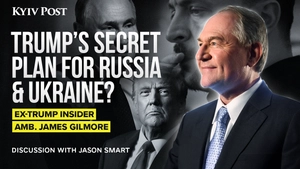A day after US President Joe Biden issued a thumbs-up for Kyiv’s use of American-made ATACMS missiles up to 180 miles within Russia, European leaders have been cautious about sending the message that their respective approvals are soon to follow.
Speaking on Monday at the G-20 summit in Brazil, British Prime Minister Keir Starmer played his cards close to the vest, explaining that he would not be “going into operational details” about easing such restrictions “because the only winner if we were to do that is [Russian leader Vladimir] Putin.”
JOIN US ON TELEGRAM
Follow our coverage of the war on the @Kyivpost_official.
For months, even before Starmer replaced Conservative PM Rishi Sunak in July, the UK has argued that Ukraine should be allowed to use British-gifted Storm Shadow missiles. Starmer repeated that sentiment in Rio de Janeiro.
One of his junior Defense ministers echoed those thoughts in London, saying the UK would “align with our allies” on such decisions.
“I’ve been really clear for a long time now we need to double down,” Starmer said. “We need to make sure Ukraine has what is necessary for as long as necessary because we cannot allow Putin to win this war.”
Meanwhile, Berlin has continued its refusal to send Kyiv the Taurus air-launched cruise missile (ALCM), which has a range nearly twice as long as that of the ATACMS.
At the G-20 meeting, Chancellor Olaf Scholz told reporters “I have explained very clearly why I do not think it is right to supply Taurus cruise missiles.”

Realpolitik and Betrayal
Instead, Berlin has offered a new shipment of 4,000 AI-guided drones.
“We have a clear understanding that the powerful weapons we have supplied so far, the long-range artillery, the rocket launchers, cannot be used to penetrate deep into the Russian hinterland,” Scholz said.
‘What the Germans are most afraid of is that Trump will make them buy gas from America’
The German chancellor spoke with Putin on Friday, catching heat from many of his European Union and NATO allies. On Monday, Polish President Andrzej Duda accused Scholz of trying to pre-empt any future negotiations by US President-elect Donald Trump.
“I believe it was an attempt to bring about a ceasefire in Ukraine before Donald Trump took office,” Duda told Bloomberg News, adding cynically, “What the Germans are most afraid of is that Donald Trump will force them to buy gas from America.”
Trump’s National Security Adviser criticizes Biden's decision on ATACMS as “escalation”
In a preview of what is likely to become policy with the incoming US administration, Trump’s National Security Adviser, Florida Congressman Michael Waltz, said that the approval for Ukraine’s long-range use of ATACMS is a “tactical decision” that threatens to “escalate” the war.
“It’s another step up the escalation ladder, and nobody knows where this is going,” Waltz told Fox News on Monday. “North Korea is unleashing ballistic missiles, artillery, and now tens of thousands of soldiers. The administration responds by lifting this restriction. North Korea sends more soldiers. South Korea is now saying it may get engaged.”
Waltz said the incoming team was not given advance notice of Biden’s announcement.
“President Trump is talking grand strategy here,” the President-elect’s right-hand man on foreign policy continued. “How do we get both sides to the table to end this war? What’s the framework for a deal and who’s sitting at that table? Those are the things that President Trump, of course, will be working with.”
Waltz is a decorated combat veteran with the US Special Forces and worked as a defense policy director for two US Secretaries of Defense: Donald Rumsfeld and Robert Gates. He has been chair of the House Armed Services subcommittee on readiness and a member of the House Foreign Affairs Committee and the Permanent Select Committee on Intelligence.
While initially a supporter of aid to Ukraine in the early parts of Russia’s full-scale invasion, Waltz has since mirrored Trump’s rhetoric about bringing the war to a swift conclusion.
🚨🇮🇱🇺🇦🇺🇸 Joe Biden attended G20 meetings today, URGING world leaders to come together to support UKRAINE and ISRAEL:
— The Saviour (@stairwayto3dom) November 18, 2024
“The United States STRONGLY supports Ukraine’s SOVEREIGNTY and territorial INTEGRITY!” pic.twitter.com/KN8tgvDB3H
“These are the actions of a rogue state.”
UN Security Council shows its disgust for Russia’s continued violations, appalling decisions
A day after Moscow launched a series of aerial assaults on civilian targets across Ukraine, killing at least ten in Odesa alone and leaving millions in the northeast without power, the UN Security Council again blasted Russia on Monday for its violations of international conventions, ignoring its North Korean sanctions obligations and its human rights abuses in general.
Biden-appointed US Ambassador to the UN Linda Thomas Greenfield took one of her last opportunities to address the body to rake Russia over the coals for inviting more than 10,000 North Korean troops to fight Ukraine and for purchasing thousands of combat drones from Iran, saying, “These are the actions of a rogue state.”
Sitting opposite the Russian delegate’s blank stare, she went on, “Russia continues to lie to our faces. One thousand and one days ago, the Russian ambassador told this very body that there would be no invasion.”
Russia continues to hold a permanent seat on the 15-member Security Council despite its flagrant violations of myriad resolutions.
On Monday, the Kremlin’s delegate took the opportunity to veto a Council resolution calling for an immediate end to hostilities in Sudan, where a war has been raging since April 2023.
Presiding over the meeting, British Foreign Secretary David Lammy called the Russian decision a “disgrace” and, according to AFP reports, “angrily denounced Moscow’s deputy UN ambassador, who ignored the remarks while looking at his phone.”
You can also highlight the text and press Ctrl + Enter














